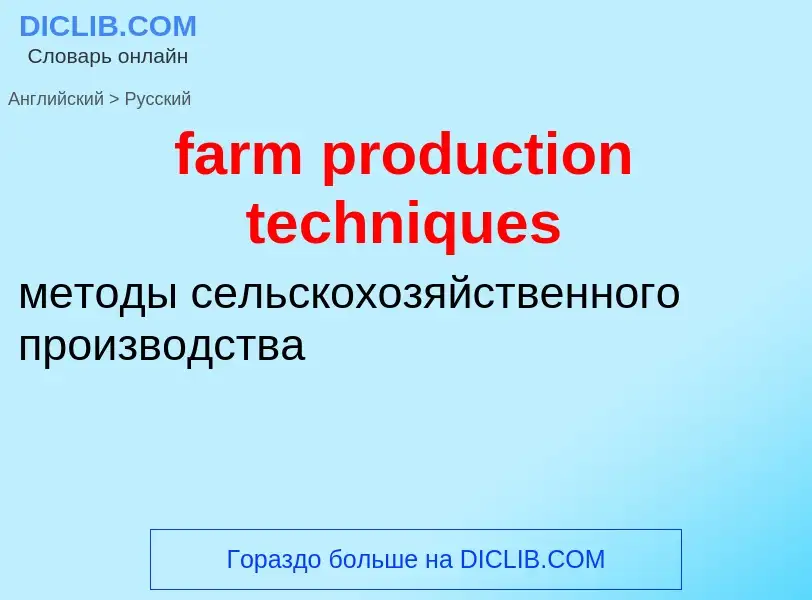Перевод и анализ слов искусственным интеллектом ChatGPT
На этой странице Вы можете получить подробный анализ слова или словосочетания, произведенный с помощью лучшей на сегодняшний день технологии искусственного интеллекта:
- как употребляется слово
- частота употребления
- используется оно чаще в устной или письменной речи
- варианты перевода слова
- примеры употребления (несколько фраз с переводом)
- этимология
farm production techniques - перевод на русский
['stʌdfɑ:m]
общая лексика
конный завод
племенная ферма
['fɑ:m'aut]
общая лексика
отдавать, передоверять часть работы другому
сдавать в аренду
фразовый глагол
общая лексика
истощать землю
особ. засевая одну культуру
сдавать в аренду
отдавать на откуп (сбор налогов и т. п.)
передавать (производство) в другую организацию
субподрядчику и т. п.
отдавать детей на воспитание (кормилице в деревню и т. п.)
американизм
передавать заключённых какой-л. частной организации в качестве рабочей силы
2) отдавать в аренду
3) отдавать на откуп
4) передавать (в другую отрасль или организацию)
[mæsprə'dʌkʃ(ə)n]
общая лексика
массовое
серийное
поточное производство
поточное/серийное производство
массовое производство
микробиология
крупномасштабное производство
Википедия
A subsistence economy is an economy directed to basic subsistence (the provision of food, clothing, shelter) rather than to the market. Henceforth, "subsistence" is understood as supporting oneself at a minimum level. Often, the subsistence economy is moneyless and relies on natural resources to provide for basic needs through hunting, gathering, and agriculture. In a subsistence economy, economic surplus is minimal and only used to trade for basic goods, and there is no industrialization. In hunting and gathering societies, resources are often if not typically underused.
In human history, before the first cities, all humans lived in a subsistence economy. As urbanization, civilization, and division of labor spread, various societies moved to other economic systems at various times. Some remain relatively unchanged, ranging from uncontacted peoples, to marginalized areas of developing countries, to some cultures that choose to retain a traditional economy.
Capital can be generally defined as assets invested with the expectation that their value will increase, usually because there is the expectation of profit, rent, interest, royalties, capital gain or some other kind of return. However, this type of economy cannot usually become wealthy by virtue of the system, and instead requires further investments to stimulate economic growth. In other words, a subsistence economy only possesses enough goods to be used by a particular nation to maintain its existence and provides little to no surplus for other investments.
It is common for a surplus capital to be invested in social capital such as feasting.

![Žabnik]] at [[Sveti Martin na Muri]], [[Croatia]], is owned by the ''Međimurje nature'' public institution Žabnik]] at [[Sveti Martin na Muri]], [[Croatia]], is owned by the ''Međimurje nature'' public institution](https://commons.wikimedia.org/wiki/Special:FilePath/Ergela međimurskog konja, Žabnik (Croatia) - kobile.jpg?width=200)
![A large stud farm in [[Gdynia]], [[Poland]] A large stud farm in [[Gdynia]], [[Poland]]](https://commons.wikimedia.org/wiki/Special:FilePath/Pl-gdynia-kolibki-stadnina.jpg?width=200)


![The assembly plant of the Bell Aircraft Corporation in 1944. Note parts of [[overhead crane]] at both sides of photo near top. The assembly plant of the Bell Aircraft Corporation in 1944. Note parts of [[overhead crane]] at both sides of photo near top.](https://commons.wikimedia.org/wiki/Special:FilePath/Airacobra P39 Assembly LOC 02902u.jpg?width=200)
![Mass production of [[Consolidated B-32 Dominator]] airplanes at [[Consolidated Aircraft]] Plant No. 4, near Fort Worth, Texas, during World War II Mass production of [[Consolidated B-32 Dominator]] airplanes at [[Consolidated Aircraft]] Plant No. 4, near Fort Worth, Texas, during World War II](https://commons.wikimedia.org/wiki/Special:FilePath/Consolidated TB-32 production line.jpg?width=200)


![museum in Yekaterinburg, Russia]]. museum in Yekaterinburg, Russia]].](https://commons.wikimedia.org/wiki/Special:FilePath/Литейная форма.jpg?width=200)
